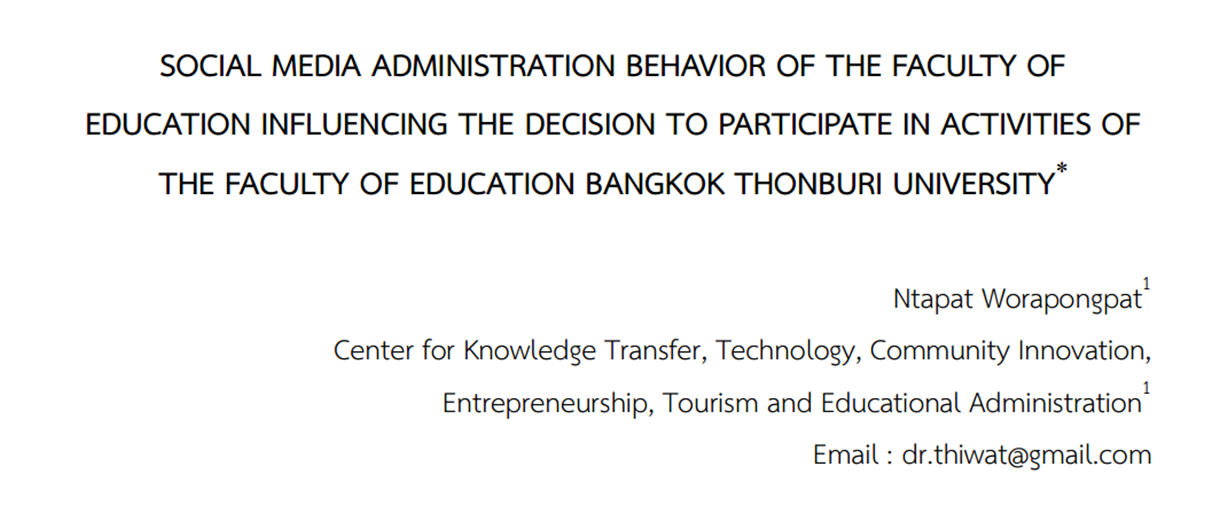SOCIAL MEDIA ADMINISTRATION BEHAVIOR OF THE FACULTY OF EDUCATION INFLUENCING THE DECISION TO PARTICIPATE IN ACTIVITIES OF THE FACULTY OF EDUCATION BANGKOK THONBURI UNIVERSITY
SOCIAL MEDIA ADMINISTRATION BEHAVIOR OF THE FACULTY OF EDUCATION INFLUENCING THE DECISION TO PARTICIPATE IN ACTIVITIES OF THE FACULTY OF EDUCATION BANGKOK THONBURI UNIVERSITY
Abstract
The objective of this research is to study the behavior and satisfactory level of Line users in participating in activities run by BTU Faculty of Education Administration. These users in the study are in the age range between 18 to 21-year-old. This research uses a mixed demographic method research in studying 400 students using Yamane Table and multi-stage Sampling, and 14 students using purposive sampling. The tools used in this research are questionnaires and unstructured interview.
The findings of this research show that the students use Line most in communicating about their participating in activities during the activity hours. These student users of Line use Line most to post the information and record activity hours. In terms of the Behavior of those using Line, the findings are: 51-100 users are average number of Line members that each user has; most users make appointment online with each other 1-2 times; most users use Line for their academic and occupational activities as well as sports and recreational activities as well as multi-school activities; after-class these users use Line to record their memorable moments. These users are only medium-leveled in their appreciation of how they use Line to contribute to ecological conservation activities. Looking at each of the items individually, there is a high-level appreciation in all of them. The high-level appreciation is in searching for networks, then membership and usage.
References
Mahidil University Population Projection for Thailand. (2006). How to design and evaluate research in education. 8th ed. Bangkok : Population Confidence Level Population.
Pattra Ruangsawat. (2010). Lifestyle and Social Networking Behaviors of working people in Bangkok. Bangkok : Thammasat University.
Pramote Prasartsakul & Pattama Wattanawong. (2005). Population situation in Thailand 2005. Bangkok : Institute for Population and Social Research, Mahidol University, Thailand.
Pravet Pravetphrai. (2013). Advanced Diploma Program, Public and Private Management King. Bangkok : Director of Ajinomoto Co., Ltd. Area Manager, Phra Pradaeng Factory.
Rajchaya Chantharung. (2011). Brand communication management on social networking website, Facebook fanpage : the GTH case study. Bangkok : Thammasat University.
Sasithorn Yuwakosol (2013). Opinion and Media Usage Among Generations in the Digital Age. The Journal of Social Communication Innovation. 9(2). 10-25.
Surasit Wittayarat. (2020). For being promoted to Associate Professor. Bangkok : Public Relations of Faculty of Management Science.
Zocial Rank. (2011). Social rank style, evolutionary psychology, personality, leadership, followership. Social Behavior and Personality. 39(7). 963-978.


